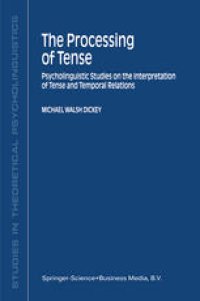
Ebook: The Processing of Tense: Psycholinguistic Studies on the Interpretation of Tense and Temporal Relations
Author: Michael Walsh Dickey (auth.)
- Tags: Psycholinguistics, Semantics, Theoretical Languages, Artificial Intelligence (incl. Robotics)
- Series: Studies in Theoretical Psycholinguistics 28
- Year: 2001
- Publisher: Springer Netherlands
- Edition: 1
- Language: English
- pdf
This work is a psycho linguistic investigation of the processing of tense (more specifically, the English past tense): When it is interpreted, how it is interpreted, and what it is interpreted with respect to. While there has been a great deal of attention paid to tense in the syntax and semantics literature, little work has been done on the details of the psychological processing of this category. The chief value and contribution of this book is to present a richly detailed in-depth study of the processing of tense in adult comprehension tasks, providing an excellent model of how to conceive of detailed experimental work against a background of sophisticated, deep, and broad linguistic theory. The discussion of the representational issues is deep and informative, and is directly brought to bear on experimental issues. The experiments aim to evaluate whether a hypothesis called "Parsimony," a highly plausible notion that has received tentative experimental support in other domains, is the chief controlling feature of the interpretation of tense. The experimental results presented quite consistently do not confirm the apparent predictions made by Parsimony, but rather tend to be more consistent with another view (which Parsimony is aimed at opposing) which holds that actual structural factors in the syntax of a sentence are a decisive factor. Along the way, the author considers a number of other plausible hypotheses as the experimental results are presented, but evaluating Parsimony remains the chief organizing principle of the line of research presented here.
This book presents an in-depth study of the processing of tense, more specifically the English past tense. Against a detailed theoretical background, it presents a number of psycholinguistic studies examining how and when the language processor assigns an interpretation to tense morphology. In so doing, it looks at several specific topics: temporal anaphora resolution, adverb preposing and discourse relations, and the sequence-of-tense ambiguity. The picture which emerges is one in which the processor is not guided by preceding context in making interpretive decisions regarding tense, as previous work has suggested. Rather, sentence-level linguistic structure appears to cue the processor in deciding which of multiple possible interpretations to assign to a past-tense marker. The book also offers novel theoretical perspectives on issues of both linguistic (temporal adverbs, sentence- and discourse-level temporal interpretation) and psycholinguistic (models of semantic processing) interest.
This work will be of interest to graduate students and researchers in linguistics and psycholinguistics working on semantic processing, temporal interpretation, and discourse processing.
This book presents an in-depth study of the processing of tense, more specifically the English past tense. Against a detailed theoretical background, it presents a number of psycholinguistic studies examining how and when the language processor assigns an interpretation to tense morphology. In so doing, it looks at several specific topics: temporal anaphora resolution, adverb preposing and discourse relations, and the sequence-of-tense ambiguity. The picture which emerges is one in which the processor is not guided by preceding context in making interpretive decisions regarding tense, as previous work has suggested. Rather, sentence-level linguistic structure appears to cue the processor in deciding which of multiple possible interpretations to assign to a past-tense marker. The book also offers novel theoretical perspectives on issues of both linguistic (temporal adverbs, sentence- and discourse-level temporal interpretation) and psycholinguistic (models of semantic processing) interest.
This work will be of interest to graduate students and researchers in linguistics and psycholinguistics working on semantic processing, temporal interpretation, and discourse processing.
Content:
Front Matter....Pages i-xiii
Introduction....Pages 1-53
Interpreting AspectP....Pages 55-113
Interpreting TenseP....Pages 115-163
Sequence of Tense and Simplicity....Pages 165-211
Conclusions and Remaining Questions....Pages 213-229
Back Matter....Pages 231-312
This book presents an in-depth study of the processing of tense, more specifically the English past tense. Against a detailed theoretical background, it presents a number of psycholinguistic studies examining how and when the language processor assigns an interpretation to tense morphology. In so doing, it looks at several specific topics: temporal anaphora resolution, adverb preposing and discourse relations, and the sequence-of-tense ambiguity. The picture which emerges is one in which the processor is not guided by preceding context in making interpretive decisions regarding tense, as previous work has suggested. Rather, sentence-level linguistic structure appears to cue the processor in deciding which of multiple possible interpretations to assign to a past-tense marker. The book also offers novel theoretical perspectives on issues of both linguistic (temporal adverbs, sentence- and discourse-level temporal interpretation) and psycholinguistic (models of semantic processing) interest.
This work will be of interest to graduate students and researchers in linguistics and psycholinguistics working on semantic processing, temporal interpretation, and discourse processing.
Content:
Front Matter....Pages i-xiii
Introduction....Pages 1-53
Interpreting AspectP....Pages 55-113
Interpreting TenseP....Pages 115-163
Sequence of Tense and Simplicity....Pages 165-211
Conclusions and Remaining Questions....Pages 213-229
Back Matter....Pages 231-312
....